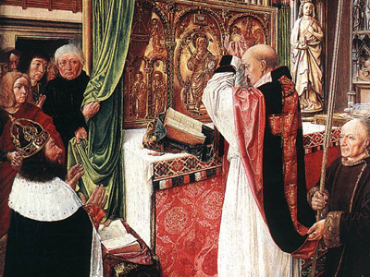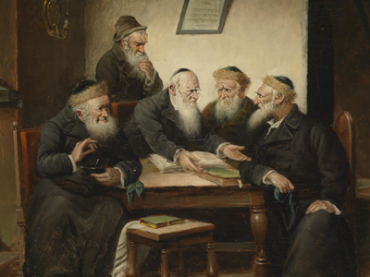Religion
Half of my Heart (paperback)
The Narratives of Zaynab, Daughter of ʿAlî
Series: Islamic History and Thought 13
ISBN: 978-1-4632-4236-7
As Abû ʿAbd Allâh al-Ḥusayn, son of ʿAlî and Fâṭima and grandson of Muḥammad, moved inexorably towards death on the field of Karbalâʾ, his sister Zaynab was drawn ever closer to the centre of the family of Muḥammad, the ‘people of the house’ (ahl al-bayt). There she would remain for a few historic days, challenging the wickedness of the Islamic leadership, defending the actions of her brother, initiating the commemorative rituals, protecting and nurturing the new Imâm, al-Ḥusayn’s son ʿAlî b. al-Ḥusayn b. ʿAlî b. Abî Ṭâlib, until he could take his rightful place. This is her story.
$58.00 $46.40
Konsekration und Konsekrationsgeschehen in der Syrischen eucharistischen Anaphora und in der Liturgi
Series: Bibliotheca Nisibinensis 2
ISBN: 978-1-4632-4259-6
Am Beispiel der Initiationssakramente (Taufe, Firmung, Eucharistiefeier) und der Priesterweihe wird einerseits die Konsekration der Materie (Wasser, Myronöl, Brot und Wein) und des Empfängers dargestellt, anderseits das Konsekrationsgeschehen der einzelnen liturgischen Vollzüge nach der syrisch antiochenischen Liturgie miteinander verglichen, analysiert und kommentiert.
$123.00
Catena Manuscripts of the Greek New Testament
A Catalogue
Series: Texts and Studies (Third Series) 25
ISBN: 978-1-4632-4260-2
The book is a synoptic catalogue of a large class of Greek manuscripts: it describes all pre-seventeenth century copies of the Greek New Testament in which the biblical text is accompanied by commentary. Manuscripts where this commentary consists of combined excerpts (catena) from the works of various authors are described in particular detail. Those that have similar content are grouped together, so that the potential relatives of any given manuscript can be easily identified. Several previously unknown types of catenae are distinguished and a number of previously unstudied codices are brought to light for the first time. To ensure its longer shelf-life, the volume systematically references on-line electronic databases (which are regularly updated). It will be of use to anyone interested in Byzantine book culture and in biblical exegesis.
$114.95
Living the Quran with Joy and Purpose
Selections on Tawhid from Said Nursi's Epistles of Light
Series: The Modern Muslim World 10
ISBN: 978-1-4632-4269-5
The current volume is an annotated translation of selections from a noteworthy Muslim theologian Said Nursi (1876-1960) on the Quranic theme of oneness of God (tawhid). Given the scarcity of theological themes in Islamic literature in English as well as the lack of studies on Said Nursi, who wrote in Ottoman Turkish, the book is an important contribution to the field. It offers a contemporary peek into the view that faith in God could be profoundly meaningful and fulfilling spiritual path.
$45.00
Isho‛dad of Merv
Commentary on Daniel
Series: Texts from Christian Late Antiquity 62
ISBN: 978-1-4632-4278-7
Ishoʿdad of Merv’s (fl. 850 AD) Commentary on Daniel provides an important witness to East Syriac exegetical technique. In it Ishoʿdad typically emphasizes an historical reading of the Old Testament above any kind of allegorical, spiritual, or even Christological interpretation. Most notable is Ishoʿdad’s belief that the Maccabees fulfilled several of the visions described in the book of Daniel, even including the Heavenly Kingdom of Daniel chapters 2, 7, and 8, and the physical resurrection of Daniel 12. These interpretations dramatically depart from most eastern and western commentators who considered Daniel’s visions to portend the rise of the Roman Empire and the advent of Christ. Ishoʿdad’s commentary is translated here into English for the first time.
$69.00
Jacob of Sarug's Homilies on the Six Days of Creation - Bundle
Edited and Translated by Edward G Mathews Jr
ISBN: 978-1-4632-4350-0
This collection brings together all 7 volumes of the long Homily 71, On the Six Days of Creation. The volumes contain the original Syriac text, fully vocalized, alongside an annotated English translation. Please note, no additional discounts apply to this bundle. The price quoted below is the lowest price.
$143.50
The Earrings of God
The absurd among us
By Fortunato Pasqualino; Translated and Annotated by Gabriel Lahood
ISBN: 978-1-4632-4359-3
Life is full of absurdities, and human misperception of such absurdities leads to a state of unrest and fear that require meaning and direction for a happy life. F. Pasqualino addresses here samples of existential absurdities, and discusses solutions offered: Taoism offers in its paradoxes a natural self-help resource. Buddhism offers a natural wisdom that is informed by a supernatural impersonal Absolute. Hinduism offers a plethora of personal gods who embody the impersonal Absolute. The Judeo-Christian-Islamic wisdom teaches a personal Absolute God whose being is distinct from, but involved with human and non-human beings. The unifying feature of these wisdoms is: Obedience to, and love of, the Absolute can rectify human misperception of life’s absurdities, dissipate fear, and provide meaning, value and a serene life. Jesus Christ, the incarnate Absolute in Christian theology, chose to become an exemplar innocent victim for love, thus giving the most absurd but victoriously redeeming love that provides a new and sublime perspective on life’s absurdities. G. Lahood’s translation and commentary make the Italian masterpiece available to an English-speaking audience.
$123.95
Maimonides
A Radical Religious Philosopher
By Shalom Sadik
Series: Judaism in Context 30
ISBN: 978-1-4632-4391-3
Was Maimonides a radical philosopher who subtly argued for a naturalist world and who saw the obligation to keep the Torah's commandments as a social and moral obligation – or was he a conservative Jewish believer who only tried to formulate philosophical arguments in favour of a revealed religion? This question has been central to the interpretation of Maimonides from the 12th century until modern times. In the four chapters of this book, Shalom Sadik argues for a radical philosophical interpretation of Maimonides.
$105.00
Baghdad during the time of ʿAbd al-Qādir al-Jīlānī
By Pascal Held
Series: Islamic History and Thought 29
ISBN: 978-1-4632-4438-5
A study of the life and background of ʿAbd al-Qādir al-Jīlānī, putative founder of the Qādiriyya order, investigating the sources for his life and attributed works. The book seeks to elucidate the ideas of al-Jīlānī, and to formulate a picture of the most prominent trends of pious and mystical thought in Baghdad during the twelfth century, providing a cultural and geographical angle to the study of Islamic mysticism and piety.
$115.00
On Knowing God
Interdisciplinary Theological Perspectives
ISBN: 978-1-4632-4462-0
This book explores the concept of Knowing God and the Knowability of God from an interdisciplinary theological perspective. Approaching the issue from the perspectives of their respective theological disciplines, contributors reflect on what it means to know God, how people of faith have sought to know God in the past, and indeed whether, and to what extent, such knowledge is even possible.
$99.00
Let God Be True
Perspectives on Romans 3
Series: Gorgias Biblical Studies 73
ISBN: 978-1-4632-4499-6
Romans 3 is a treasure trove of theological riches, a thematic junction where nearly every major theme in this complex epistle emerges. Yet for this same reason, exegetically it is one of the most notoriously difficult passages in the New Testament. The focused and interdisciplinary approach to this one particular chapter in Romans allows for greater depth of research than is generally possible in commentaries, and the variety of methodological approaches employed shines light from different angles to bring out the numerous facets of these verses. Those who write commentaries or do research on Romans, and especially on Romans 3, will find in this book a wealth of information. Likewise, it will be of value to students in advanced exegetical classes and to those doing postgraduate research on Romans 3 and related topics.
$114.95 $91.96
Traces of Sufism in British Romanticism
Series: Gorgias Islamic Studies 20
ISBN: 978-1-4632-4552-8
This work argues that there are traces of Sufism to be found in British Romanticism. Most scholars of Romanticism have overlooked the impact of Sufism on Romanticism in favour of Christian and neo-Platonic Mysticism, but this work fills in this gap by showing the magnitude of the influence of Sufism on the Romantics without negating the influence of other -isms. What elements of Sufism attracted the attention of the Romantics? And why were the Romantics attracted more to Sufism and Sufi poets than to Christian Mysticism and Mystic poets?
$95.00 $76.00
Celebrating the Holy Saints
The Origin, Evolution, and Liturgical Use of the Mälkəʿ
Series: Gorgias Eastern Christian Studies 67
ISBN: 978-1-4632-4557-3
This book explores the somatic hymns – Mälkəʿ – addressed to saints of the Ethiopian and Eritrean Churches, their origin and development, and transmission and use in the present day. This vast and hitherto untapped collection of hymns are an important source for an accurate understanding of the Church’s spirituality and liturgy.
$95.00
Filter by
Filter by price
Filter by manufacturer















